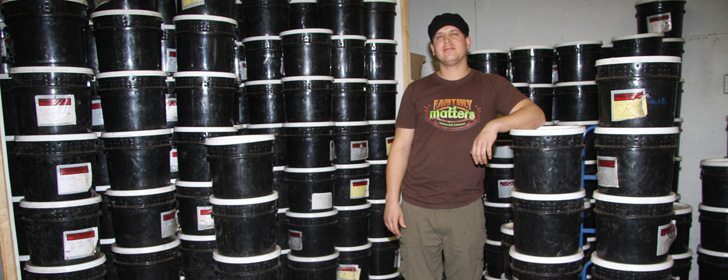Raising and selling worms | Extra care needed to help worms survive and reproduce
COALDALE, Alta. — Though it could be said that every body starts a worm farm eventually, Dan Rollingson has chosen to do it while he’s above ground.
And so are his worms.
Rollingson operates Earthly Matters, which markets worms, worm castings and custom soil blends. Now in his fourth year of business, he said it is starting to turn a profit and is ready to capitalize on what he sees as growing interest in soil health.
“There really is going to be a movement towards the repair of soil, and I think there’s going to be a lot more people doing what I’m doing and that’s going to be fine. We need more people doing it,” he said.
Read Also

Rural Manitoba resources slim on natural disaster planning
A study from Brandon University’s Rural Development Institute has found that many rural and small municipalities don’t have the staff or resources to make formal climate plans against natural disaster.
Raising worms is a different kind of farming, but there are definite similarities to the conventional sort. Rollingson’s farm requires soil and water, nutrients and suitable habitat.
And what do worms eat? Grain, of course. Rollingson feeds them a mash of barley, wheat and other ingredients, plus calf milk replacer to help gizzard function.
He houses 100,000 worms in three-gallon buckets with aeration holes at their tops.
The worms are put through an electric screener every few weeks to separate them from their castings. They are then put into a new bucket full of moss bedding, with a new batch of food, and kept in a garage at a temperature of about 20 C.
The castings are bagged and sold in sizes from three to 1,000 litres.
Rollingson said customers range from small home gardeners to greenhouse operators.
He sells his worm castings as Earthly Matters soil enhancer at farmers markets’ and four hardware stores in southern Alberta.
Some people are put off by the idea of worms and their excrement, and Rollingson is circumspect about that, though he does note men tend to be more squeamish than women.
“It’s not for everybody and I understand that. I’m not going to try and push it,” he said.
However, the worms leave their containers only when conditions are poor and will not survive in the open because they quickly dry out. Giving worms what they need in their own enclosure keeps them housed and productive.
Rollingson had a bitter experience with worm mortality when he received his first shipment of 8,000 African night crawlers from an American firm.
They didn’t transport well and once in his garage, things went from bad to worse. He was left with 40 survivors.
“I took those 40 and I babied them. I made a small incubator for them out of an old freezer, and then it took a couple months but then the reproduction started to happen.”
He has had some of his breeding stock for three years and has read that they can live up to 15 years. As hermaphrodites, every worm can produce cocoons, and each cocoon can contain up to five worms. Cocoons are collected every two weeks, and reproduction can be rapid under ideal conditions.
Rates can be controlled by altering conditions, such as decreasing the ideal level of 60 to 80 percent soil moisture or lowering the temperature.
This type of worm will not survive Canadian winters, so there is no worry about escape and entry into the ecosystem, he said. African night crawlers are top dwelling, unlike Canadian dew worms, which are deep burrowers and can overwinter.
Rollingson also plans to market worm “tea” and extracts made by adding water to castings to produce a liquid that will stimulate soil biology through its rich micronutrient and micro-organism content.
Rollingson says his wife, Stephanie, has been involved in the venture from its start.
“She helps with the website and a lot of administration,” he said. “It’s been a family venture. I’m kind of the boss, I guess, but my whole family has helped me out along the way.”
His mother and stepfather, Monica and Andy Mulder, and his brother, Neil, have also helped.
“I probably wouldn’t be doing it still if it weren’t for them,” Rollingson said.
This spring, he plans to work with Verge Permaculture of Calgary by selling large totes of castings to stores that have pre-sold the product to their customers.
He also wants to venture into soil reclamation using worm products. Rollingson became fascinated with soil health while researching vermiculture, and worms’ role in that process continues to intrigue him.
This summer, he experimented with worm castings on a plot of land near Lethbridge. A small crop of 80 potato plants was a success, with an average of 10 to 12 potatoes per plant and as many as 32, without clipping or use of pesticides.
















